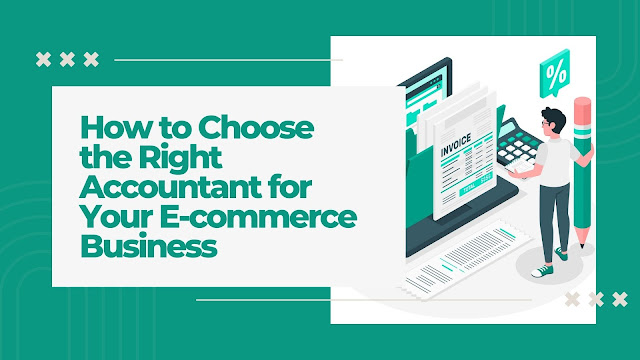How to Choose the Right Accountant for Your E-commerce Business
In the fast-paced world of e-commerce, where every transaction matters, having a competent accountant can make all the difference. Your e-commerce business needs more than just someone who can crunch numbers; you need a strategic partner who can help you navigate the financial complexities of your online enterprise. In this guide, we'll walk you through the steps to choose the perfect accountant for your e-commerce venture.
Why a Specialized E-commerce Accountant?
Before we dive into the selection process, it's crucial to understand why a specialized e-commerce accountant is necessary. E-commerce businesses have unique financial needs, such as dealing with multiple online platforms, understanding digital payment gateways, tracking inventory, and managing sales tax compliance across different states or countries. A general accountant may not possess the expertise required to handle these complexities effectively.
Now, let's explore the steps to choose the right accountant for your e-commerce business:
1. Define Your Needs
Begin by assessing your specific accounting needs. Consider the size of your e-commerce business, the volume of transactions, the number of sales channels you operate on, and your expansion plans. List down the accounting tasks you require assistance with, such as bookkeeping, tax planning, financial analysis, and audit preparation. Having a clear understanding of your needs will help you find an accountant with the right skill set.
2. Look for E-commerce Experience
When seeking an accountant for your e-commerce business, experience in the e-commerce sector is invaluable. E-commerce accountants are familiar with the unique challenges and opportunities presented by online businesses. They can provide insights into optimizing your financial processes, reducing tax liabilities, and maximizing profits within the e-commerce landscape.
3. Verify Credentials
Ensure that the accountant you're considering is qualified and certified. Look for certifications like Certified Public Accountant (CPA) or Chartered Accountant (CA). These certifications indicate that the accountant has met the professional standards required for accounting and taxation expertise.
4. Ask for References
Don't hesitate to ask for references from potential accountants. Contact their previous clients, particularly those with e-commerce businesses, and inquire about their experience. Ask about the accountant's ability to meet deadlines, their communication skills, and their overall effectiveness in handling financial matters.
5. Assess Technology Proficiency
In the digital age, accounting relies heavily on technology. Your accountant should be proficient in accounting software, e-commerce platforms, and relevant tools for financial analysis. Inquire about the software and systems they use and whether they can integrate with your e-commerce platforms for seamless data flow.
6. Consider Communication
Effective communication is essential for a successful partnership with your accountant. Ensure that the accountant is responsive and can explain complex financial matters in a way that you can understand. Good communication can help you make informed decisions and stay on top of your finances.
7. Evaluate Fees
Discuss the accountant's fee structure upfront to avoid any surprises later on. Some accountants charge hourly rates, while others offer fixed monthly fees. Be transparent about your budget and negotiate a fee that aligns with your financial capabilities.
8. Assess Availability
Consider the accountant's availability, especially during tax season or when you need urgent financial advice. You want someone who can provide timely assistance and not leave you hanging when you need help the most.
9. Review Track Record
Look into the accountant's track record of successfully handling e-commerce clients. Have they helped businesses like yours grow and thrive financially? Past performance can be a good indicator of their ability to meet your specific needs.
10. Trust Your Gut
Finally, trust your instincts. Choose an accountant with whom you feel comfortable and confident. Building a strong working relationship with your accountant is vital for the long-term success of your e-commerce business.
Conclusion
In conclusion, selecting the right accountant for your e-commerce business involves a careful assessment of your needs, seeking e-commerce expertise, verifying credentials, checking references, assessing technology proficiency, considering communication skills, evaluating fees, and reviewing the track record. Remember that this choice can significantly impact the financial health and growth of your e-commerce venture.
Choosing a specialized accountant experienced in e-commerce is like having a trusted advisor by your side, helping you navigate the complexities of online business finances. So, take your time, do your research, and make a well-informed decision. Your e-commerce business deserves the best support possible to thrive in the competitive online marketplace.
Bookkeeping Services are an essential part of managing your e-commerce business. Make sure to choose an accountant who can provide top-notch bookkeeping services tailored to the unique needs of your online venture.
Also Read This:-




Comments
Post a Comment